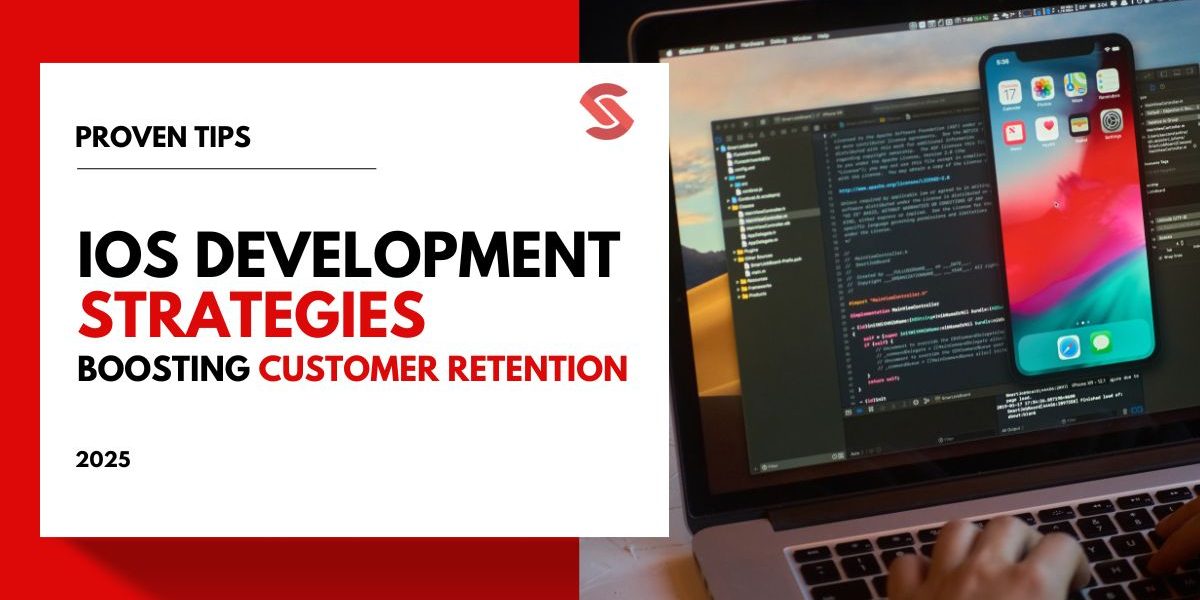Did you know that businesses with custom mobile apps see higher customer engagement and smoother operations? As mobile technology becomes a bigger part of daily life, more companies are turning to custom apps to tackle specific needs.
Whether it’s improving how customers interact with your brand or streamlining internal processes, a tailored app can make all the difference.
In this blog, we’ll explore how custom mobile apps can help your business grow by offering practical solutions that fit your goals and help you scale up efficiently.
The Impact of Custom Apps on Business Efficiency
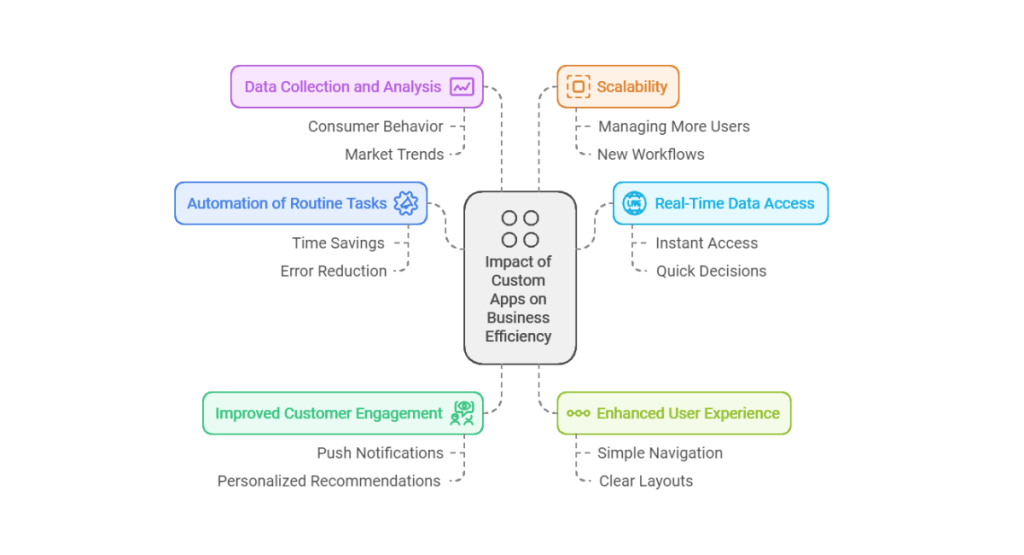
Custom apps boost business efficiency by automating tasks and reducing human errors. They integrate with your existing systems, saving time and simplifying processes. With less manual work, teams can focus on important tasks, improving overall productivity.
Forrester Consulting has found that businesses report savings of up to 20-30% in operational costs when using custom software solutions. Custom apps help businesses operate smarter, reducing wasted time and money while improving day-to-day operations.
Automation of Routine Tasks
Automating daily processes such as data entry, invoice generation, and inventory tracking not only eliminates manual labor but also lowers the likelihood of errors. It’s similar to using an app to handle hundreds of invoices in a matter of minutes instead of hours.
This gives your staff more time to concentrate on really important things, like serving clients or organizing your company’s next major move. In addition to saving time, moving repetitive work to an app increases team efficiency, boosts overall production, and makes space for expansion.
Real-Time Data Access
Businesses have instant access to real-time data through tailored apps, which puts important information at their fingertips. Managers can now review sales figures, keep an eye on inventories, and track performance in real time without waiting for reports.
It makes it simple to recognize a low inventory alarm as soon as it occurs and replenish supplies before problems arise. Or identifying the best-selling items and immediately modifying your approach. Having current data enables you to respond to changes as they occur, make well-informed decisions quickly, prevent expensive delays, and maintain your company’s smooth and effective operation.
Improved Customer Engagement with Custom Features
Mobile apps that offer personalized and interactive features can increase customer engagement. Tools to keep customers connected and involved include push notifications, personalized product recommendations, and real-time chat help.
Tailored promotions promote loyalty by enticing customers to return. Responsive and user-friendly experiences strengthen customer connections, increasing customer satisfaction and encouraging further brand involvement.
Enhanced User Experience with Customized Interfaces
Creating user interfaces that are easy to use and intuitive can significantly improve both employee satisfaction and operational efficiency. When employees can navigate systems quickly and with less frustration, their productivity increases, and they feel more engaged in their work.
- Simple navigation helps employees complete tasks faster.
- Clear layouts reduce training time and errors.
- Intuitive design boosts user confidence and reduces frustration.
- Customized interfaces can focus on specific business needs, enhancing overall efficiency.
Data Collection and Analysis for Informed Decision-Making
Businesses can make quicker, better decisions by using applications to collect and analyze data. Businesses may readily monitor consumer behavior, operational effectiveness, and market trends with accurate data collecting.
To maximize resources, enhance services, and maintain an advantage over rivals, managers are empowered by this real-time data to make strategic decisions swiftly. Businesses can make better decisions that promote growth and success by modifying their strategy on the fly when they have access to comprehensive insights.
Scalability for Growing Business Needs
Apps must manage more users, new workflows, and rising demand as businesses expand. Well-designed apps can adjust to these changes without undergoing significant redesigns.
They grow easily, enabling companies to implement additional functions or offerings as required. Because of its scalability, the software may expand along with the company, promoting efficiency and success going forward.
Enhancing Customer Engagement Through Personalization
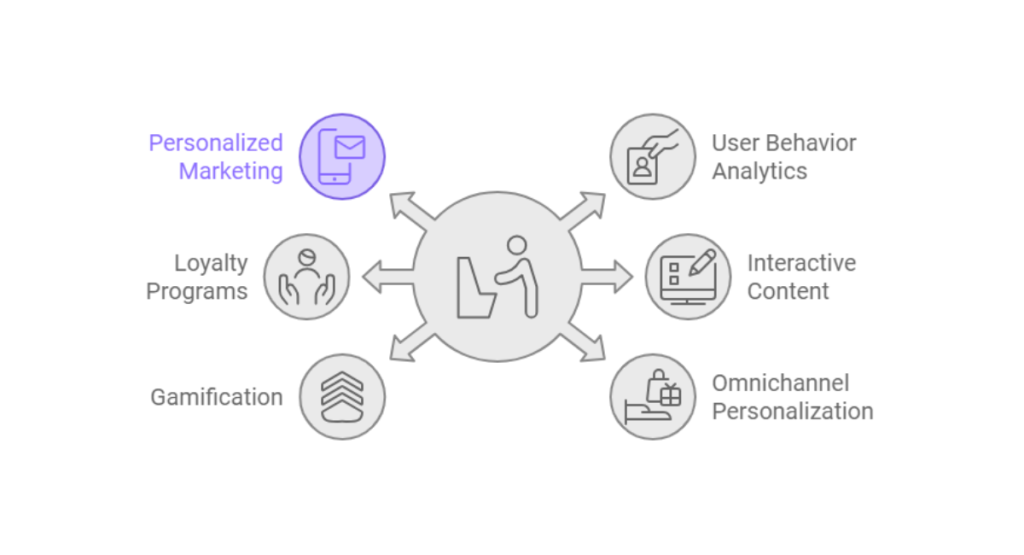
Applications can offer product recommendations or information that is customized to each user’s preferences by using consumer data. Customers feel appreciated and understood when they receive this degree of individuality, which inevitably keeps them more involved.
“Personalization helps create a more engaging and intuitive user experience, which leads to higher customer satisfaction and retention,” says Nick Babich, a mobile app development expert. Users are more likely to stick around and become loyal clients when they see material that speaks directly to them.
Personalized Marketing Communications
Companies can keep people interested and connected to their brand by sending them content and push notifications that are tailored to their interests.
A retail app, for instance, can increase engagement and sales by providing personalized product recommendations or discounts based on a customer’s previous purchases.
Personalized communications improve consumer-business relationships, resulting in improved conversion rates and more customer loyalty.
User Behavior Analytics
Apps can monitor user behavior and collect useful information such as how frequently users interact with specific features or which sites they visit the most. Businesses can make well-informed decisions and modify their apps to offer a more seamless experience by examining these trends.
This entails providing services and content that are genuinely pertinent to users, enhancing the significance of interactions, and raising customer satisfaction, all of which encourage repeat business.
Loyalty Programs and Personalized Rewards
Loyalty programs, personalized through user data, help retain customers by offering rewards that match their preferences and behavior. By providing targeted offers, discounts, or exclusive content, businesses can build long-term relationships.
Personalized rewards make customers feel valued, increasing their engagement and encouraging repeat purchases, leading to stronger customer loyalty.
Interactive Content for Deeper Engagement
Interactive content, like quizzes, polls, and surveys, creates a fun and engaging experience for users. These features allow businesses to gather insights while keeping users involved.
Personalized interactive content boosts engagement by making customers feel involved, leading to deeper connections and longer-lasting relationships with the brand.
Gamification to Enhance User Involvement
Adding game elements like points, badges, or leaderboards can significantly boost user interaction. These features tap into users’ natural desire for competition and achievement, making the experience more engaging.
According to a study by Badgeville, gamification can increase engagement by 50%. Rewarding users for their actions keeps them involved and motivated, fostering long-term loyalty and active participation.
Omnichannel Personalization for Smooth Customer Experiences
Through omnichannel personalization, businesses can create unified customer experiences across web, mobile, and social media platforms. This approach ensures that customers receive a consistent and seamless experience, regardless of the platform they use.
By personalizing interactions across multiple channels, businesses can enhance customer engagement, build stronger connections, and increase satisfaction. A smooth, integrated experience makes it easier for customers to interact with the brand, which fosters long-term loyalty and keeps them engaged.
Scaling Your Business with Mobile Solutions
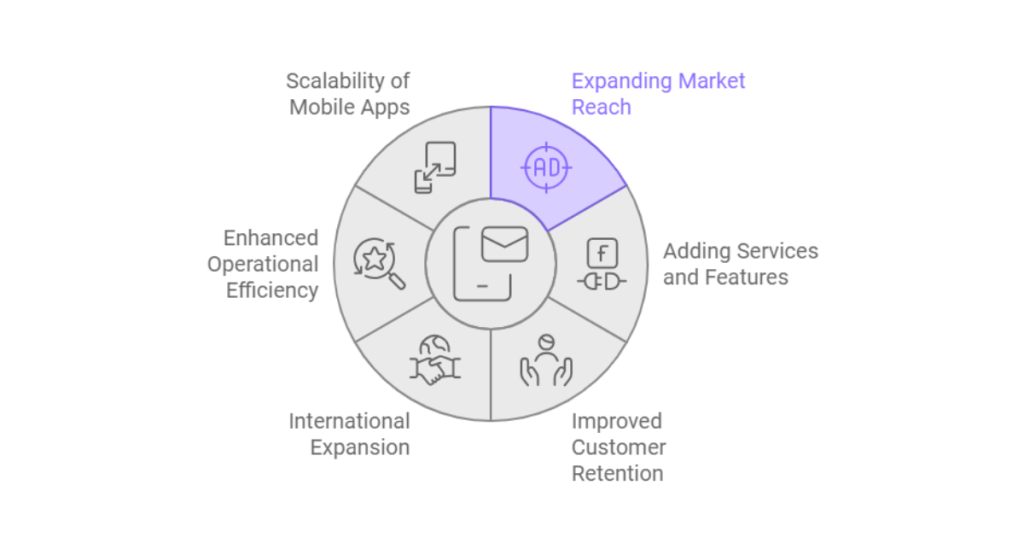
Mobile solutions help businesses scale by allowing them to expand into new markets and add services easily. Custom apps grow with the business, supporting more users and new features without major changes.
With mobile apps, businesses can reach a wider audience, offer services on demand, and quickly adapt to market needs, ensuring smooth and continuous growth. Mobile solutions provide the flexibility needed for business scalability and long-term success.
Expanding Market Reach
Mobile solutions give businesses the flexibility to scale by expanding into new markets and easily adding services as needed. As your business grows, these apps grow with you, handling more users and new features without the need for a complete overhaul.
With mobile apps, reaching a broader audience becomes effortless, offering services on demand and adapting to changing market conditions quickly. This ensures your business stays on track for smooth, continuous growth.
Adding Services and Features
Businesses can quickly adapt to market changes by integrating new features or services into their apps. As your company expands or customer needs evolve, adding new functions becomes seamless without requiring a full rebuild. This flexibility helps maintain competitiveness and efficiency. Key benefits include:
- Easily integrating new services based on customer trends.
- Expanding functionality without affecting existing systems.
- Launching updates quickly to stay aligned with market needs.
- Enhancing user experience with continuous feature improvements.
Improved Customer Retention via Mobile Accessibility
Making services accessible on mobile platforms allows customers to engage with a business whenever they need them, leading to higher convenience and satisfaction. When users can easily access your services on their phones, they are more likely to stay loyal and make repeat purchases.
This round-the-clock availability builds trust and long-term relationships, ensuring customers remain engaged with your brand. Increased mobile accessibility not only boosts customer retention but also contributes to business growth by encouraging higher engagement and loyalty.
Mobile Apps for International Expansion
Mobile apps break down geographical and time-zone barriers, allowing businesses to expand into global markets. By offering a mobile app, companies can reach users in different countries who can access their services or products at any time.
This allows businesses to target new audiences, personalize services for international users, and offer support across various regions. With no physical limitations, businesses can scale globally, tapping into international markets and driving continuous growth in new territories.
Enhanced Operational Efficiency with Mobile Workflows
Mobile apps allow employees to work efficiently from anywhere, whether in the field, on the road, or remotely. Employees can continue their tasks without delay by having access to necessary tools, real-time data, and communication channels, reducing downtime and improving productivity.
Tasks such as reporting, inventory management, or client interactions can be handled on the go, ensuring work progresses smoothly. This level of mobility enhances overall operational efficiency, enabling businesses to maintain productivity while meeting their goals faster and with fewer disruptions.
Scalability of Mobile Apps to Accommodate Growing User Bases
As businesses grow, their mobile apps must scale to handle an increasing number of users without compromising performance. Scalable mobile solutions allow apps to accommodate more traffic while maintaining a smooth, responsive user experience. This ensures that as your customer base expands, your app continues to function efficiently.
- Supports higher traffic volumes without slowdowns
- Adapts to new features or services as needed
- Ensures consistent performance for all users, no matter the scale
By focusing on scalability, businesses can grow confidently, knowing their mobile app can handle increased demand, new users, and evolving business needs without a drop in quality or performance. This flexibility supports long-term growth and user satisfaction.
Boosting ROI with Custom Mobile Apps
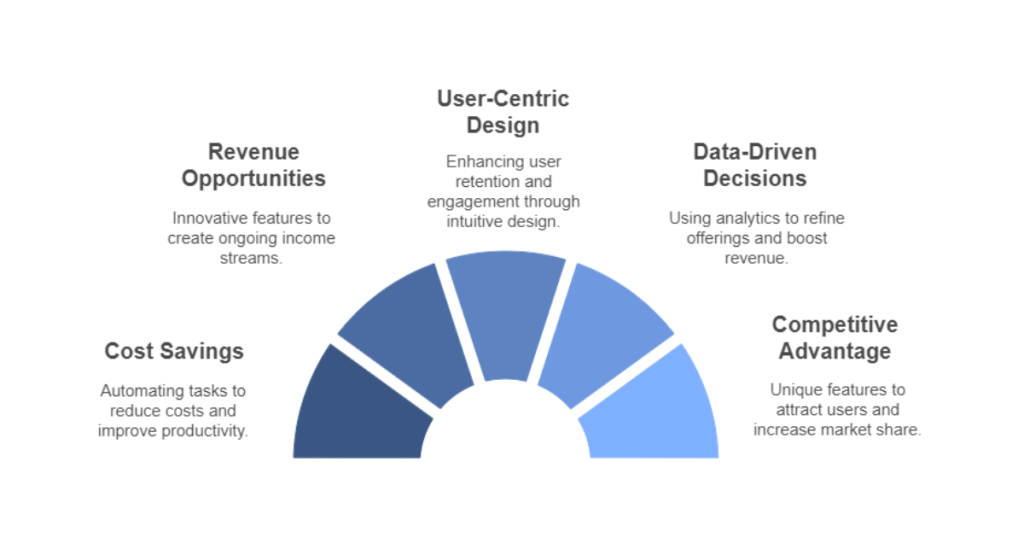
Investing in custom mobile apps can significantly boost ROI by increasing revenue and reducing operational costs. These apps improve efficiency through automation, cut down on manual work, and enhance customer engagement, leading to higher sales.
Over time, the cost savings and revenue gains from streamlined processes and improved user experience far outweigh the initial development investment, ensuring long-term financial benefits.
Cost Savings
By automating repetitive tasks like data entry and order processing, businesses can reduce labor costs and minimize errors. Automation frees up employees for more valuable tasks, improving productivity.
Apps streamline workflows, eliminate inefficiencies, and optimize resource allocation. Over time, this leads to significant cost savings while enhancing business performance and supporting growth.
Revenue Generation Opportunities
Apps offer businesses innovative ways to generate revenue, such as in-app purchases, subscription models, and premium content offerings. These features create ongoing income streams by encouraging users to make regular payments for added services or exclusive content.
By providing extra value to customers, businesses not only boost revenue but also enhance customer loyalty and satisfaction. These tools enable companies to diversify their income sources, ensuring steady financial growth while maintaining strong customer engagement. Over time, this approach helps increase the overall revenue potential of the business.
Maximizing ROI Through User-Centric Design
Investing in a user-friendly app design leads to higher user retention and engagement, which directly impacts ROI. When users find an app intuitive and easy to navigate, they are more likely to stay engaged, make repeat visits, and spend more time on the platform.
As Don Norman, a UX expert, says, “A user-centered design increases satisfaction and drives business success.” This approach ultimately boosts customer loyalty and leads to a higher return on investment for businesses.
Revenue Growth Through Data-Driven Decision Making
Collecting and analyzing user data through mobile apps helps businesses understand customer behavior and preferences. These insights allow companies to refine their offerings, enhance services, and make informed decisions, leading to increased revenue.
Peter Sondergaard from Gartner highlights this by stating, “Information is the oil of the 21st century, and analytics is the combustion engine.” By leveraging data-driven decision-making, businesses can identify trends, optimize products, and achieve sustained revenue growth.
Competitive Advantage Through Unique App Features
Offering exclusive app features that competitors don’t provide can give businesses a strong market edge, attracting more users and increasing revenue. Unique functionalities make your app stand out, creating a compelling reason for customers to choose your service over others.
- Attracts new users with unique, desirable features
- Increases customer retention by offering something competitors lack
- Drives higher revenue by enhancing the overall value of the app
Success Stories: Businesses Transformed by Custom Apps
Success stories of businesses transformed by custom apps show real growth and impact. For example, Domino’s Pizza saw a 19% increase in online sales after launching their custom app, which offered features like easy ordering and real-time tracking.
This business saved costs and improved customer satisfaction, proving that custom apps drive tangible results and business transformation. Investing in tailored mobile solutions helps companies stay competitive and thrive in evolving markets.
Final Thoughts: Why Your Business Needs a Custom App from Us
Choosing our custom app development service means getting exactly what your business needs to grow and succeed. We focus on your specific challenges, creating an app that helps boost efficiency and increase profits. You handle your business while we manage the technical details.
for your business.
FAQs about Custom Application
What is custom app development?
Custom app development is the process of creating a software application tailored to the specific needs of a business. Unlike off-the-shelf solutions, custom apps are built to match unique processes, ensuring a better fit, higher efficiency, and integration with existing systems.
How can custom apps improve business efficiency?
Custom apps improve efficiency by automating repetitive tasks, reducing errors, and integrating with existing systems. This leads to faster workflows, less manual input, and more accurate data processing, allowing teams to focus on strategic tasks instead of day-to-day operations.
How do custom apps boost ROI?
Custom apps boost ROI by streamlining processes, reducing operational costs, and increasing customer engagement. These apps help businesses save time, reduce human errors, and attract more customers through personalized services, leading to higher profitability over time.
Can a custom app help my business grow?
Yes, custom apps are designed to scale as your business grows. They adapt to new needs, customer demands, and markets, allowing you to expand your services, increase customer outreach, and support more users without the need for major changes to the app.
What industries benefit from custom apps?
Custom apps benefit a wide range of industries, including retail, healthcare, logistics, finance, and education. Any business that wants to optimize its processes, offer better customer experiences, or expand its market reach can benefit from a custom app.
How does personalization in custom apps help customer engagement?
Personalized custom apps use customer data to offer tailored content, product recommendations, and personalized push notifications. This keeps users engaged, encourages repeat usage, and strengthens their connection with the brand, leading to higher customer retention and satisfaction.
How do custom apps support market expansion?
Custom apps make it easy to expand into new markets by providing businesses with the tools to reach a broader audience. They offer global accessibility, multilingual support, and features that help tailor products or services to specific regions, helping businesses grow beyond geographic limits.
What are the cost-saving benefits of a custom app?
Custom apps reduce costs by optimizing resource allocation, automating manual processes, and reducing errors. They improve operational efficiency, leading to lower labor costs and faster task completion, which results in long-term savings and improved profitability.
How can apps generate new revenue streams?
Custom apps can generate new revenue streams through features like in-app purchases, subscription models, premium content, and paid services. These options allow businesses to monetize the app directly, adding income sources while enhancing user experience.
How do apps track user behavior?
Custom apps track user behavior by collecting data on user interactions, such as feature usage, time spent in the app, and purchasing patterns. This data helps businesses analyze trends, improve the app’s performance, and tailor future updates to better meet customer needs.
What’s the timeline for developing a custom app?
The timeline for developing a custom app varies based on complexity, features, and business requirements. Typically, it can take anywhere from 3 to 9 months, depending on the size and scope of the project, including design, development, testing, and deployment.
How do I start the process of developing a custom app?
To start, you need to clearly define your business needs and goals. Contact a custom app development company to discuss your vision, and they will guide you through the steps of planning, design, development, and deployment, ensuring the app aligns with your business objectives.




